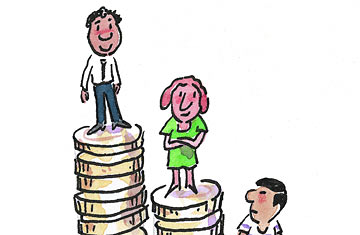
What if there was a way to raise a population's life expectancy and reduce its rates of crime, suicide, teenage pregnancy and mental illness, among other social problems? British epidemiologists Richard Wilkinson and Kate Pickett believe they have found one. In The Spirit Level: Why Greater Equality Makes Societies Stronger, published in the U.S. on Dec. 22, they present data suggesting that almost every indicator of social health in wealthy societies is related to its level of economic equality. (See the data here). Comparing statistics between developed economies and within the U.S., Wilkinson and Pickett argue GDP and overall wealth matter little to wealthy societies. Rather, it is the gap between the rich and poor that is telling. They spoke to TIME about what they believe are revolutionary findings.
You found a very strong correlation between income equality and
societal well-being. Why had no one spotted it before?
KP: We and other researchers had noticed this trend. But the field was
splintered — people looked at only health, or only crime. We've brought
it together. Treating the 50 United States as separate countries and then
comparing them really strengthened the evidence.
Why does greater income inequality lead to social problems?
RW: In hierarchical societies the quality of social relationships becomes
strained, and that can be stressful. Many of the effects we note spring from
chronic stress, whether you are talking about obesity or mental health or
the sexual development of girls stressed early in childhood.
KP: Humans are highly social beings — we can either behave competitively or we can be cooperative. In more unequal societies, people are more out for themselves. Their involvement in community life drops away, and that’s corrosive.
Is it just the poor who suffer in unequal societies?
KP: The impact of inequality, although greatest among the poor, does seem to
effect people almost all the way up the income ladder. We are not sure about
the super-rich. They make up less than 1% of the population, so it's
difficult to track.
If you had to pick a U.S. state to live in based on your data, which
would it be?
KP: Vermont, with Iowa, New Hampshire or Utah close behind.
RW: Vermont or perhaps New Hampshire. But the point is that at any given level of income, education or occupational level, you are better off in a more-equal state. You will be less likely to have mental illness, and your children will be more likely to avoid drugs or teenage pregnancy, or become victims of violence.
How did you define income equality?
RW: There are many measures. We compared the gap between the richest and poorest 20% of households in each society. You can use more sophisticated indicators like the gini
index, but they produce broadly the same answers.
So is an emphasis on GDP growth misleading?
RW: Increases in income and economic growth are important in
poorer countries where food, shelter and clean water are important. But when
it's a matter of getting more cars per household or higher-quality
electronics, it doesn't translate to well-being.
How can we achieve more income equality in a market economy?
RW: Some relatively equal societies, such as Japan, and some states such as
New Hampshire have smaller differences between earnings before taxes and
benefits. The other way is to start off like Sweden does — with large
inequalities between earnings — and then redistribute wealth with high
taxes and benefits. I think we need to do both. To reduce earning
differences you need as many different forms of economic democracy as
possible. We need to make it a bit more embarrassing for company directors
to give themselves huge pay deals and bonuses while holding down wages
elsewhere in their company.
You believe an emphasis on economic equality could help the battle
against climate change. How?
RW: The biggest challenge to slowing carbon emissions is consumerism.
Consumerism is driven by status competition and is intensified by
inequality. Further, more-equal societies are more willing to think about
the common good and to be more public-spirited. You can see this in terms of
the proportion of waste recycled or the proportion of international
development aid given. Both are greater in more-equal countries. In
more-equal countries, business leaders are more likely to stress that their
governments should abide by international environmental agreements, too.
KP: Since we finished the book, we’ve found that more-equal societies are more innovative in terms of patents granted per capita. This is probably because they develop more human capital. Kids do better in school, and social mobility is higher. We need innovation to tackle climate change.
